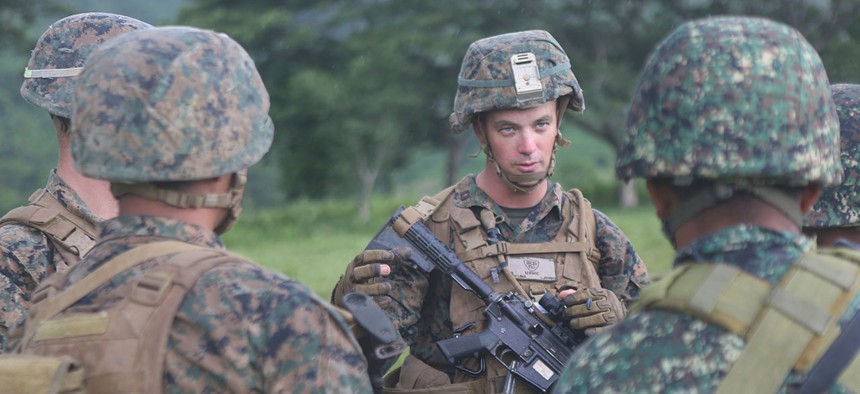
Marine Corps Capt. Kevin Jones, a San Antonio native, explains Marine Corps infantry tactics to members of the Philippine Marine Corps Cpl. Carl King/Marine Corps
An End to U.S.-Philippine Defense Cooperation?
The Philippines’ decision to call off coordinated military exercises with the U.S. marks a significant shift in the long-time allies’ relationship.
The Philippines announced Friday plans to cancel future joint military exercises with the United States in the South China Sea—a marked break in defense cooperation between the long-standing allies that follows weeks of rhetoric aimed at the U.S. by the new Filipino president.
“This year would be the last,” Rodrigo Duterte, the president of the Philippines, said Friday of the countries’ joint military exercises.
Addressing the U.S. directly, he said: “For as long as I am there, do not treat us like a doormat because you’ll be sorry for it. I will not speak with you. I can always go to China.”
In addition to halting military exercises between the two countries, Delfin Lorenzana, the country’s defense minister, said Duterte hopes to dismiss U.S. troops helping monitor and fight Islamist militants in the southern part of the country—a task he said the Philippines would assume once it acquired the necessary intelligence-gathering capabilities.
In response to the possibility of the coordinated drills between the two countries ending, Roger Hollenbeck, a U.S. military spokesman, said, “I have nothing to do with that and we are going to continue to work together, we’ve got a great relationship.”
The future of this “great relationship” remains unclear, however. The Philippine president hasn’t shied away from suggesting that he may pursue closer relations with Russia and China—at the expense of his country’s ties with the U.S. But a closer relationship with China might not be quite as easy as Duterte hopes: Both countries claim the South China Sea. As my colleague J. Weston Phippen pointed out:
More than $5 trillion of trade passes through its waters each year, and while China claims most of the South China Sea,Taiwan, Vietnam, Malaysia, and the Philippines have competing claims and would like a larger share. In July, an international tribunal in The Hague ruled in favor of the Philippines’ claim to a portion of the sea and concluded China has no legal right over the bulk. China refused to acknowledge the ruling.
That could make for an awkward introduction, or an interesting bargaining chip as Duterte seeks a closer relationship with Beijing—assuming Duterte sticks by his words.
Since his election over the summer, Duterte has used testy language to describe criminals, drug users, the U.S., and President Obama. Last month, he called Obama a “son of a bitch” in response to a U.S. inquiry about his government’s extrajudicial killings of more than 2,000 people in an effort to “kill all the drug lords.” Duterte later apologized, only to tell Obama to “go to hell” a month later.
Duterte was also criticized after he likened his ambitions to the Nazis’ mass murder of 6 million Jews, saying, “Now there’s 3 million, there’s 3 million drug addicts. There are. I’d be happy to slaughter them.”
Those comments aren’t restricted to Duterte. As the BBC reports, Teodoro Locsin Jr., the Philippines’ recently appointed ambassador to the United Nations, said in August: “I believe that the Drug Menace is so big it needs a FINAL SOLUTION like the Nazis adopted. That I believe. NO REHAB.” Locsin, who is not a career diplomat, issued an apology Thursday for invoking the Holocaust, though not for view towards the country’s drug war.
NEXT STORY: The U.S. Army Equipment That Ended Up on eBay







